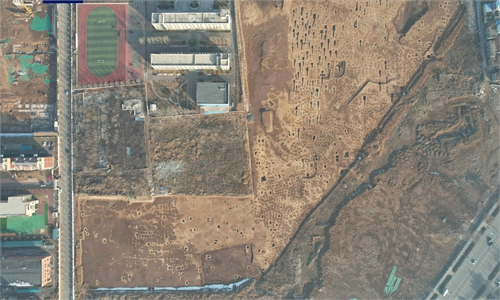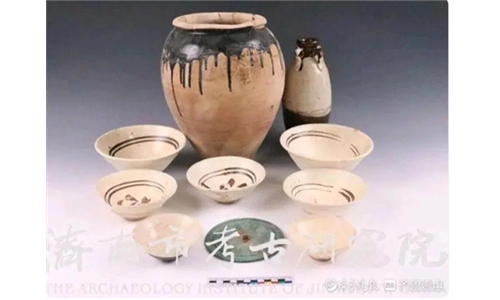
The civil affairs departments of Beijing, Tianjin, and Hebei collaborated in hosting an event where people could scatter ashes into the sea as a special sea burial ship, carrying the ashes of 35 deceased individuals, set sail toward the Bohai Bay in Tianjin on March 31, 2024. Photo: IC
Ahead of the Qingming Festival, many localities across China are vigorously promoting eco-friendly burials, which analysts believe will help to alleviate the strain on land resources, contribute to environmental protection, and also fulfill people's emotional needs for remembering their departed loved ones.
Qingming Festival, also known as "Tomb-Sweeping Festival," will fall on Thursday this year, which is a traditional Chinese festival for people to pay tribute to the deceased and to worship their ancestors. As the holiday approaches, eco-friendly burial is being promoted in various locations nationwide, embraced by a growing number of people.
On Sunday, the civil affairs departments of Beijing, Tianjin, and Hebei collaborated in hosting an event where people could scatter ashes into the sea as a special sea burial ship, carrying the ashes of 35 deceased individuals, set sail toward the Bohai Bay in Tianjin. Family representatives shared stories about their loved ones, and after a moment of silence in tribute, staff handed over the ashes to the family members.
As the ship reached the designated sea area, the family members, guided by the staff, boarded the deck, and with gentle hands, they scattered the ashes of their loved ones into the vast blue waves.
According to China's Ministry of Civil Affairs, since May 1994, Beijing has been carrying out the activity of scattering ashes at sea. Over the past 30 years, a total of 774 collective ash scattering activities have been organized for the ashes of nearly 34,000 deceased individuals, with the number of participates increasing each year.
Shenzhen introduced flower bed burials for the first time ahead of this year's Qingming Festival. The ashes buried there are not engraved with a tombstone, name, or any identification. Instead of a traditional grave, the ashes are buried deep in the flower bed using biodegradable containers, according to the personnel in charge.
In just 10 days, more than 250 citizens applied for this new type of burial, with some saying that the departed loved ones accompanying the flowers could be seen as a continuation of life. According to media reports, a total of 252 sets of ashes were buried in the flower beds on Thursday.
Southwest China's Yunnan Province also promoted eco-friendly burial by encouraging people to choose burial methods such as tree burial or flower burial. Currently, the eco-friendly burial rate in Yunnan has reached 51.02%, and the province is also promoting green and low-carbon memorial methods such as offering fresh flowers and online memorials.
Additionally, provinces including Shandong, Henan and Liaoning are all ramping up efforts to promote alternative burial methods and encourage greater participation in eco-friendly funerals.
Funerals are of great importance in China, with the "luxury" of funerals and tombs once being used as a standard to evaluate the filial piety of the deceased's descendants. However, the increasing amount of land occupied by traditional cemeteries has put pressure on urban planning and land resources.
"Eco-friendly burial will reduce the use and consumption of land resources, making it a good balance mechanism for resource scarcity, especially in large cities. This also represents a harmonious coexistence between humans and nature," Li Zhiqing, a professor of environmental economics and Chinese economy at Fudan University, told the Global Times on Monday.
The adoption of new burial practices represents a significant shift from traditional methods to modern, environmentally conscious alternatives, and this proactive approach is not only beneficial to protecting the environment but also encourages a greater appreciation for and protection of the land, analysts said.
They also pointed out that this new type of green burial involves a change in the concept of funeral for the masses, as many people used to believe that burial in the ground is the most respectful way so that the deceased can rest in peace.
"Nowadays, people have many ways and means to commemorate the deceased, and society also attaches great importance to people's need for emotional sustenance and commemorating their ancestors, which is not contradictory to the new type of burial advocated at present," Zhang Yiwu, a professor of Chinese language and literature from Peking University, told the Global Times on Monday.
Zhang further emphasized that opting for eco-friendly burial methods not only can make people honor the memory of their ancestors but also encourages a more diverse approach to ancestral worship. In addition, these practices align with the principles of environmental protection and natural ecology, meeting the needs for sustainable development.
The new types of burial method are gaining popularity among a growing number of individuals. A staff member surnamed Tao from a funeral company in Beijing told the Global Times on Monday that new methods such as tree burials, flower burials, and sea burials not only save land resources, but are also environmentally friendly and cost-effective, and as a result are gaining more and more recognition and acceptance from the public.
"In recent years, as the importance of ecological environmental protection continues to resonate with the public, there is a growing desire among individuals to opt for a more sustainable and environmentally friendly approach to burial. Various forms of ecological burial are also constantly innovating, and the willingness of families to embrace these alternatives is on the rise," Tao said.


